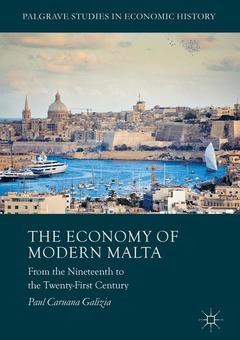The Economy of Modern Malta, 1st ed. 2017 From the Nineteenth to the Twenty-First Century Palgrave Studies in Economic History Series
Auteur : Caruana Galizia Paul

Analyzes the impact of the colonial state on agriculture, manufacturing, and trade in Malta
Investigates the post-colonial transition to protectionism and state control of the Maltese economy
Explores the liberalization and globalization of Malta's economy from 1987 onward
Overviews Malta's contemporary economic institutions and argues for more inclusive growth
Date de parution : 12-2016
Ouvrage de 384 p.
14.8x21 cm
Disponible chez l'éditeur (délai d'approvisionnement : 15 jours).
Prix indicatif 142,41 €
Ajouter au panier


